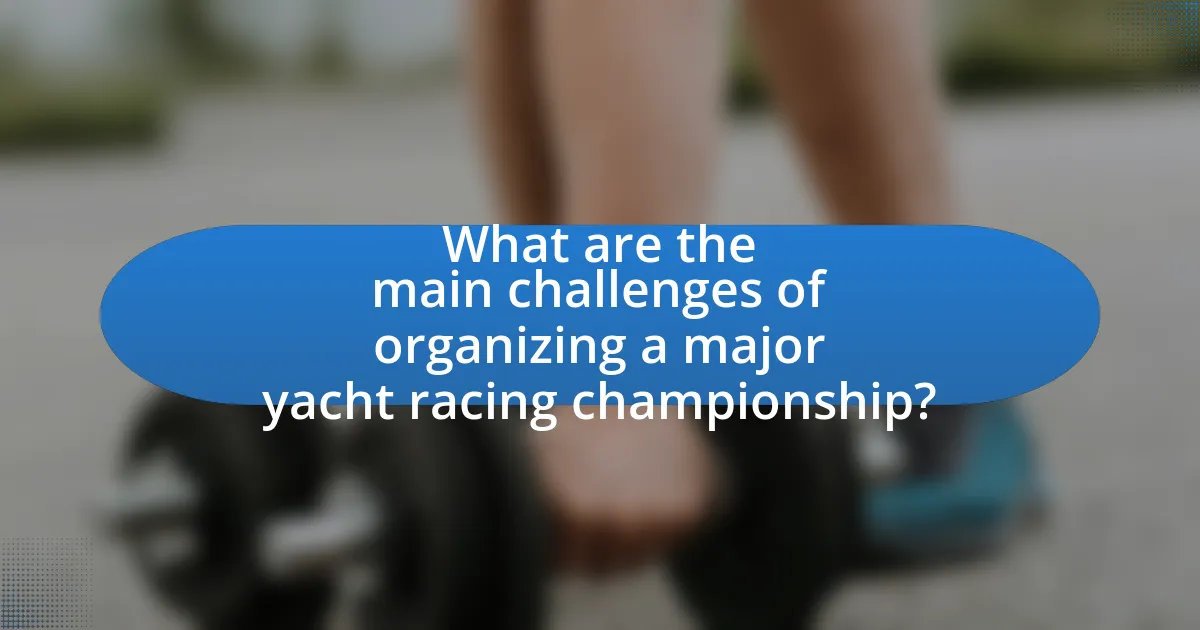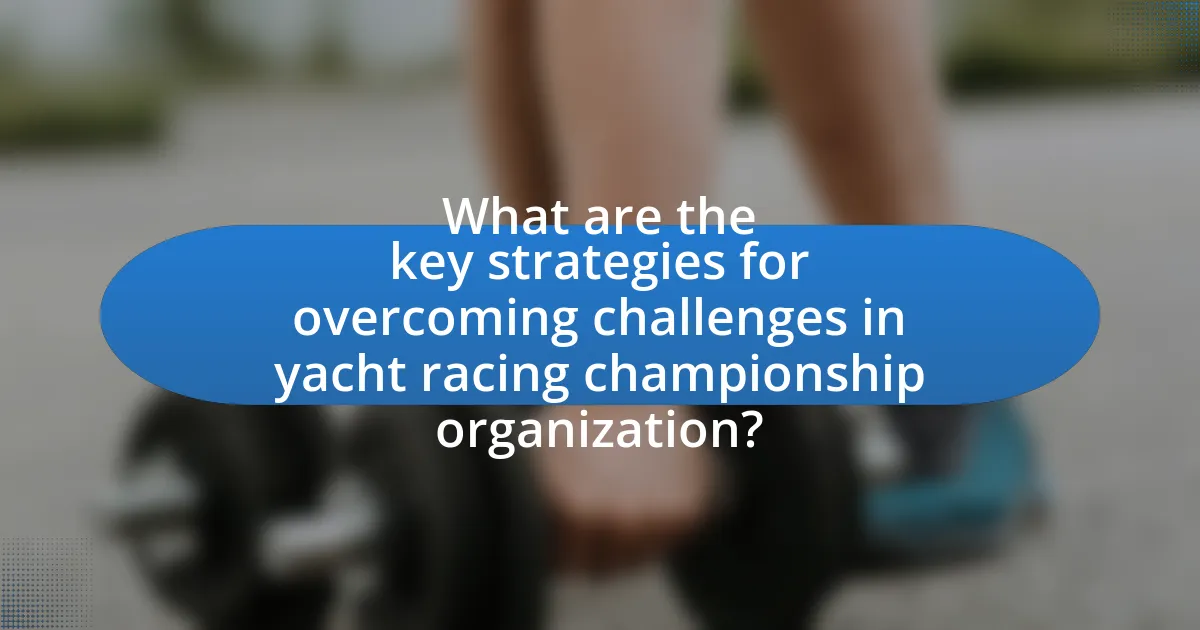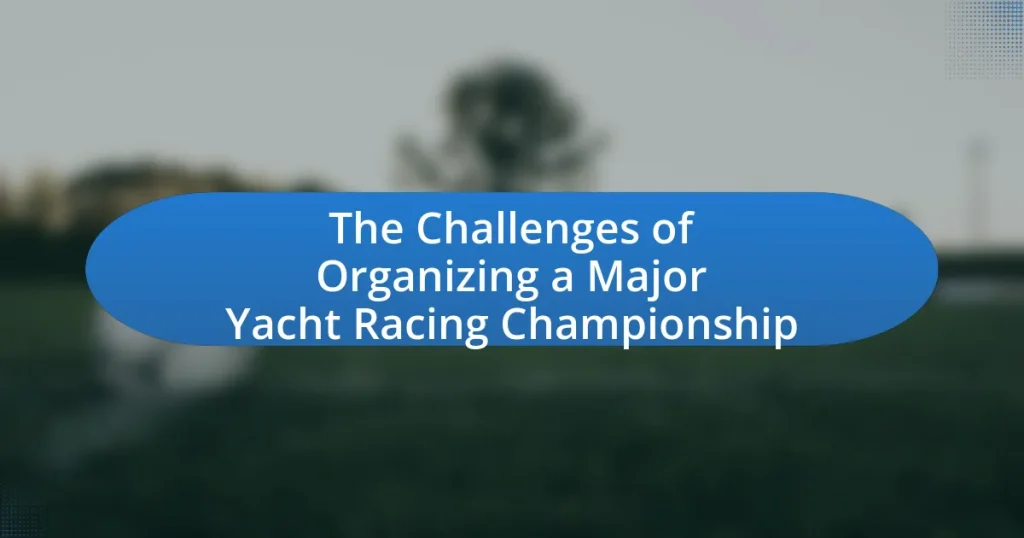The article focuses on the challenges of organizing a major yacht racing championship, highlighting key areas such as logistical coordination, regulatory compliance, and financial management. It discusses the impact of logistical issues on scheduling and resource allocation, the importance of adhering to international maritime laws, and the financial complexities involved, including sponsorship acquisition and operational costs. Additionally, the article outlines strategies for effective communication, risk management, and enhancing participant and spectator experiences, while also addressing lessons learned from past events to improve future championships.

What are the main challenges of organizing a major yacht racing championship?
The main challenges of organizing a major yacht racing championship include logistical coordination, regulatory compliance, and financial management. Logistical coordination involves arranging the racecourse, securing permits, and ensuring safety measures for participants and spectators. Regulatory compliance requires adherence to international sailing regulations and local laws, which can vary significantly by location. Financial management is critical, as securing sponsorships and managing budgets are essential for covering costs associated with venue, equipment, and personnel. These challenges are compounded by the need for effective communication among stakeholders, including teams, sponsors, and local authorities, to ensure a successful event.
How do logistical issues impact the organization of yacht racing championships?
Logistical issues significantly impact the organization of yacht racing championships by affecting scheduling, resource allocation, and participant coordination. For instance, the availability of suitable venues, weather conditions, and transportation logistics can lead to delays or cancellations, as seen in the 2021 America’s Cup, where adverse weather forced schedule adjustments. Additionally, managing the movement of yachts, equipment, and personnel requires meticulous planning; failure to do so can result in increased costs and operational inefficiencies. Furthermore, logistical challenges can hinder communication among teams, race officials, and sponsors, ultimately affecting the overall success and safety of the event.
What are the key logistical components involved in yacht racing events?
The key logistical components involved in yacht racing events include race course planning, equipment transportation, crew management, safety protocols, and communication systems. Race course planning ensures that the route is navigable and safe, while equipment transportation involves moving yachts and gear to the event location, which can be complex due to the size and weight of the vessels. Crew management is essential for coordinating the team members, including their schedules and roles during the race. Safety protocols are critical to protect participants and spectators, often requiring compliance with maritime regulations. Finally, effective communication systems are necessary for real-time updates and coordination among race officials, crews, and support teams. These components are vital for the successful execution of yacht racing events, as evidenced by the logistical challenges faced during major championships like the America’s Cup, where meticulous planning and coordination are crucial for safety and performance.
How can organizers effectively manage transportation and accommodation for participants?
Organizers can effectively manage transportation and accommodation for participants by implementing a comprehensive logistical plan that includes pre-event surveys, partnerships with local transportation services, and block booking of accommodations. Pre-event surveys allow organizers to gauge the specific needs and preferences of participants, ensuring that transportation options align with their schedules. Collaborating with local transportation services, such as shuttle companies or ride-sharing platforms, facilitates efficient movement between venues and accommodations. Additionally, block booking accommodations at various price points ensures that participants have convenient lodging options, which can be further optimized by providing a centralized booking system. This approach not only enhances participant satisfaction but also streamlines the overall event experience, as evidenced by successful case studies from previous yacht racing championships where similar strategies were employed.
What regulatory and legal challenges do organizers face?
Organizers of major yacht racing championships face significant regulatory and legal challenges, primarily related to compliance with maritime laws, environmental regulations, and safety standards. These challenges arise from the need to adhere to international maritime conventions, such as the International Convention for the Safety of Life at Sea (SOLAS), which mandates specific safety measures for vessels participating in races. Additionally, organizers must navigate local laws that govern waterway usage, which can vary significantly by region and may include restrictions on race times or environmental protections that limit activities in sensitive areas. Furthermore, liability issues related to accidents or injuries during events can lead to complex legal disputes, necessitating comprehensive insurance coverage and legal counsel to mitigate risks.
What permits and licenses are required for yacht racing championships?
Yacht racing championships require various permits and licenses, including a racing permit from the national sailing authority, insurance certificates, and environmental permits. The national sailing authority, such as World Sailing, mandates that organizers obtain a racing permit to ensure compliance with safety and regulatory standards. Additionally, liability insurance is essential to protect against potential accidents during the event. Environmental permits may also be necessary to address any ecological concerns related to the racecourse. These requirements ensure that the championship adheres to legal, safety, and environmental regulations.
How do international maritime laws affect the organization of these events?
International maritime laws significantly influence the organization of major yacht racing championships by establishing safety, environmental, and navigational regulations that must be adhered to. These laws, such as the United Nations Convention on the Law of the Sea, dictate the rights and responsibilities of nations regarding the use of the world’s oceans, which directly impacts race routes, safety protocols, and environmental protections. For instance, compliance with the International Maritime Organization’s guidelines ensures that events do not violate territorial waters or disrupt marine ecosystems, thereby affecting logistical planning and operational procedures for the championship.
How does weather influence the planning of yacht racing championships?
Weather significantly influences the planning of yacht racing championships by determining race schedules, course layouts, and safety protocols. Organizers must assess wind patterns, wave heights, and potential storms to ensure optimal racing conditions and participant safety. For instance, the 2013 America’s Cup was notably affected by weather conditions, leading to race delays and course adjustments due to high winds. Accurate weather forecasting is essential, as it allows organizers to make informed decisions that enhance the competitiveness and safety of the event.
What strategies can be employed to mitigate weather-related risks?
To mitigate weather-related risks in organizing a major yacht racing championship, event planners can implement several strategies. These include developing a comprehensive weather monitoring system to provide real-time updates, establishing contingency plans for adverse weather conditions, and scheduling races during historically favorable weather periods. For instance, utilizing advanced meteorological tools can enhance decision-making, as evidenced by the use of satellite technology in previous championships, which improved safety and operational efficiency. Additionally, having alternative race routes or dates can minimize disruptions caused by unexpected weather events, ensuring the event’s success and safety for participants and spectators.
How do organizers prepare for unexpected weather conditions during the event?
Organizers prepare for unexpected weather conditions during the event by implementing contingency plans that include real-time weather monitoring and flexible scheduling. They utilize advanced meteorological tools to track weather patterns and make informed decisions about race timings and safety protocols. For instance, the use of satellite weather data allows organizers to anticipate severe weather changes, enabling them to adjust race courses or postpone events if necessary. This proactive approach is essential, as evidenced by the 2019 America’s Cup, where organizers successfully navigated sudden weather shifts by altering race schedules based on accurate forecasts.

What are the financial challenges associated with organizing yacht racing championships?
Organizing yacht racing championships faces significant financial challenges, primarily due to high operational costs, sponsorship acquisition difficulties, and unpredictable weather conditions. The operational costs include expenses for logistics, safety measures, and venue preparation, which can exceed millions of dollars. For instance, the 36th America’s Cup in 2021 had an estimated budget of around $100 million. Securing sponsorships is often challenging as companies may hesitate to invest in events with uncertain returns on visibility and engagement. Additionally, weather unpredictability can lead to race cancellations or delays, resulting in financial losses from ticket sales and sponsorship commitments. These factors collectively create a complex financial landscape for organizers.
How do sponsorships and funding affect the success of yacht racing events?
Sponsorships and funding are critical to the success of yacht racing events as they provide the necessary financial resources for logistics, marketing, and prize distribution. Without adequate sponsorship, organizers may struggle to cover costs such as venue rental, safety measures, and promotional activities, which can lead to lower participation rates and diminished spectator interest. For instance, the America’s Cup, one of the most prestigious yacht racing events, relies heavily on sponsorship deals, with teams often securing millions in funding to enhance their competitiveness and visibility. This financial backing not only supports the operational aspects of the event but also elevates its profile, attracting more spectators and media coverage, which in turn can lead to increased revenue from ticket sales and merchandise.
What types of sponsors are most beneficial for yacht racing championships?
Corporate sponsors, particularly those from luxury brands, technology companies, and beverage industries, are most beneficial for yacht racing championships. Luxury brands, such as high-end watchmakers and automotive manufacturers, align with the prestige of yacht racing, enhancing brand visibility among affluent audiences. Technology companies contribute by providing advanced equipment and innovations that improve performance and safety, while beverage companies often engage in sponsorships that enhance the event experience for spectators. For instance, the America’s Cup has seen significant sponsorship from brands like Louis Vuitton and Oracle, demonstrating the effectiveness of aligning with high-profile sponsors that resonate with the event’s target demographic.
How can organizers attract and retain sponsors for future events?
Organizers can attract and retain sponsors for future events by demonstrating clear value through targeted marketing strategies and measurable outcomes. By aligning sponsorship opportunities with the sponsors’ brand goals and audience demographics, organizers can create tailored packages that appeal to potential sponsors. For instance, showcasing past event success through metrics such as attendance figures, media coverage, and social media engagement can provide concrete evidence of the event’s reach and impact. Additionally, maintaining open communication and providing regular updates on event planning and execution fosters a strong relationship with sponsors, increasing the likelihood of their continued support.
What are the costs involved in hosting a major yacht racing championship?
The costs involved in hosting a major yacht racing championship typically range from several hundred thousand to millions of dollars. These expenses include venue rental, which can be significant depending on the location, as well as costs for race management, safety measures, and logistics such as transportation and accommodation for participants and officials. Additionally, marketing and promotional expenses are necessary to attract sponsors and spectators, while insurance costs are essential to cover potential liabilities. Historical examples, such as the 2017 America’s Cup, reported costs exceeding $100 million, illustrating the financial scale involved in such events.
How can organizers budget effectively for all aspects of the event?
Organizers can budget effectively for all aspects of the event by creating a detailed budget plan that includes all potential costs and revenue sources. This involves identifying fixed and variable expenses such as venue rental, equipment, staffing, marketing, and permits, while also estimating income from sponsorships, ticket sales, and merchandise. Research indicates that successful event budgeting requires a contingency fund of 10-20% of the total budget to cover unexpected costs, as highlighted in the Event Budgeting Guide by the Event Leadership Institute. By regularly reviewing and adjusting the budget throughout the planning process, organizers can ensure financial control and adaptability, ultimately leading to a successful yacht racing championship.
What financial risks should organizers be aware of?
Organizers of a major yacht racing championship should be aware of several financial risks, including budget overruns, sponsorship shortfalls, and unforeseen operational costs. Budget overruns can occur due to unexpected expenses related to logistics, permits, or equipment, which can exceed initial estimates. Sponsorship shortfalls may arise if anticipated sponsors withdraw or fail to meet their financial commitments, impacting overall revenue. Additionally, unforeseen operational costs, such as weather-related delays or damage to vessels, can significantly affect the financial stability of the event. According to a study by the International Sailing Federation, financial mismanagement is a leading cause of failure in organizing large-scale sailing events, highlighting the importance of thorough financial planning and risk assessment.

What are the key strategies for overcoming challenges in yacht racing championship organization?
Key strategies for overcoming challenges in yacht racing championship organization include effective planning, stakeholder engagement, and risk management. Effective planning involves establishing a detailed timeline and budget, ensuring all logistical aspects are addressed, such as venue selection and equipment procurement. Stakeholder engagement is crucial; involving local authorities, sponsors, and the sailing community fosters collaboration and support, which can mitigate potential conflicts. Risk management entails identifying potential challenges, such as adverse weather conditions or safety concerns, and developing contingency plans to address them. These strategies are validated by successful yacht racing events that emphasize thorough preparation and community involvement, leading to smoother operations and enhanced participant experiences.
How can effective communication improve the organization of yacht racing events?
Effective communication enhances the organization of yacht racing events by ensuring clarity and coordination among all stakeholders, including race officials, participants, and support teams. Clear communication channels facilitate timely dissemination of critical information such as race schedules, safety protocols, and weather updates, which are essential for the smooth execution of the event. For instance, the World Sailing organization emphasizes the importance of effective communication in managing race logistics and ensuring compliance with regulations, which directly impacts the safety and performance of the competitors. Additionally, studies show that organizations with strong communication practices experience fewer misunderstandings and conflicts, leading to more efficient event management and a better overall experience for participants and spectators alike.
What communication tools are essential for coordinating teams and participants?
Essential communication tools for coordinating teams and participants in a yacht racing championship include instant messaging platforms, video conferencing software, and project management tools. Instant messaging platforms like Slack or Microsoft Teams facilitate real-time communication, allowing teams to share updates and coordinate tasks efficiently. Video conferencing software such as Zoom or Google Meet enables face-to-face discussions, which are crucial for strategic planning and problem-solving. Project management tools like Trello or Asana help organize tasks, deadlines, and responsibilities, ensuring that all participants are aligned and informed about their roles. These tools collectively enhance collaboration and streamline communication, which is vital for the successful organization of a major yacht racing championship.
How can organizers ensure clear communication with stakeholders?
Organizers can ensure clear communication with stakeholders by establishing structured communication channels and regular updates. Implementing tools such as project management software and scheduling consistent meetings fosters transparency and keeps all parties informed. Research indicates that effective communication strategies can enhance stakeholder engagement and satisfaction, as evidenced by a study published in the Journal of Business Communication, which found that organizations with clear communication frameworks experience 25% higher stakeholder trust levels.
What best practices can be implemented to enhance the overall experience for participants and spectators?
To enhance the overall experience for participants and spectators in a major yacht racing championship, organizers should implement effective communication strategies, ensure accessibility, and provide engaging activities. Effective communication, such as real-time updates on race progress and weather conditions via mobile apps or social media, keeps participants and spectators informed and engaged. Ensuring accessibility through well-planned transportation, viewing areas, and facilities accommodates diverse audiences, enhancing their experience. Additionally, providing engaging activities, such as interactive exhibits, food festivals, and entertainment, creates a festive atmosphere that attracts more spectators and enriches the overall event experience. These practices are supported by successful case studies from previous yacht racing events, which have shown that improved communication and accessibility significantly increase spectator satisfaction and participation rates.
How can organizers create engaging experiences for spectators during the event?
Organizers can create engaging experiences for spectators during the event by incorporating interactive elements such as live commentary, spectator zones, and technology-driven experiences like augmented reality. Live commentary enhances understanding and excitement, while designated spectator zones provide comfortable viewing areas with amenities. Additionally, using augmented reality can allow spectators to visualize race data and statistics in real-time, increasing their engagement. According to a study by the International Journal of Sports Marketing and Sponsorship, events that integrate technology and interactive experiences see a 30% increase in spectator satisfaction.
What role does technology play in improving yacht racing championship organization?
Technology plays a crucial role in enhancing the organization of yacht racing championships by streamlining logistics, improving communication, and providing real-time data analysis. Advanced tracking systems, such as GPS and AIS (Automatic Identification System), allow race organizers to monitor yacht positions and conditions accurately, ensuring safety and efficient race management. Additionally, digital platforms facilitate better communication among teams, officials, and spectators, enhancing the overall experience. For instance, the use of drones for aerial footage and live streaming has transformed how events are broadcasted, increasing audience engagement. Furthermore, data analytics tools enable organizers to assess performance metrics and optimize race strategies, leading to more competitive and well-managed events.
What are the lessons learned from past yacht racing championships?
Past yacht racing championships have highlighted several key lessons, primarily focusing on the importance of meticulous planning and adaptability. Effective organization requires comprehensive risk management strategies to address unpredictable weather conditions, as evidenced by the 1979 Fastnet Race, where severe storms led to tragic outcomes, prompting changes in safety regulations. Additionally, the need for clear communication among teams and organizers has been underscored, as miscommunication can lead to disqualification or safety hazards, demonstrated during the 2013 America’s Cup when a lack of clarity regarding rules resulted in significant penalties. Furthermore, the integration of technology for real-time data analysis has proven essential for enhancing performance and safety, as seen in the advancements made during the 2017 America’s Cup, where teams utilized sophisticated analytics to optimize their strategies. These lessons emphasize that thorough preparation, clear communication, and technological integration are critical for the success of yacht racing championships.
How can organizers apply past experiences to future events?
Organizers can apply past experiences to future events by analyzing previous event outcomes to identify strengths and weaknesses. For instance, if a past yacht racing championship faced logistical issues, organizers can implement improved planning and communication strategies to mitigate similar problems in future events. Historical data, such as participant feedback and attendance figures, can guide decisions on venue selection, scheduling, and resource allocation, ensuring that organizers build on successful elements while addressing past shortcomings. This approach is supported by event management studies that emphasize the importance of learning from previous experiences to enhance future event execution and participant satisfaction.
What common pitfalls should be avoided in yacht racing championship organization?
Common pitfalls to avoid in yacht racing championship organization include inadequate planning, insufficient safety measures, and poor communication among stakeholders. Inadequate planning can lead to logistical issues, such as scheduling conflicts and resource shortages, which can disrupt the event. Insufficient safety measures may result in accidents or injuries, as seen in past events where safety protocols were not strictly enforced, leading to negative outcomes. Poor communication among stakeholders, including sponsors, participants, and local authorities, can create misunderstandings and misalignments, ultimately affecting the event’s success. These pitfalls can significantly impact the overall experience and safety of the championship, highlighting the importance of thorough preparation and coordination.


